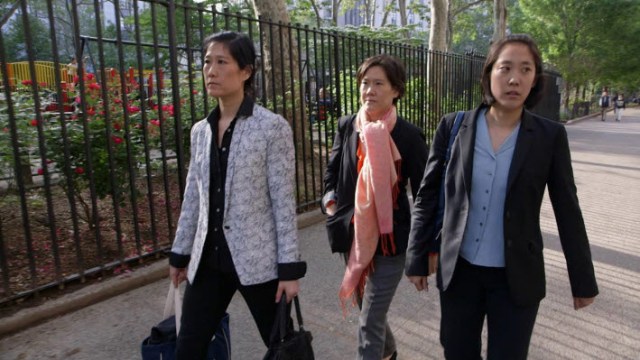
As watching documentary film “Abacus: Small Enough to Jail”, I could not help but roll my eyes at the absurd legal injustice shown in the documentary. Here is a small decent bank which has provided a considerable financial help to many people of its local community, and it is often infuriating to see how this bank was openly indicted for a minor fraud case which, as far as I could see from the documentary, was not the fault of a Chinese American family who has diligently run this bank for many years.
In the beginning, we meet Thomas Sung, the founder of the Abacus Federal Savings Bank. Born in Shanghai, 1935, he emigrated to New York City when he was young, and then he went to a law school to be a lawyer. After noticing that many of his fellow immigrant people in Chinatown could not get loans from American banks, he came to decide to establish a bank for his people, and his bank soon came to deal with numerous local customers in Chinatown. During one scene, Sung shows us a room full of safe deposit boxes, and we can sense that he is genuinely proud of being someone very trustworthy to many people out there in Chinatown.
When Sung and his wife watch Frank Capra’s “It’s a Wonderful Life” (1946), which is incidentally his favorite movie, there is a clear parallel between him and James Stewart’s decent hero in that classic film. Like Stewart’s character, Sung sincerely wanted to help people, and his wife later tells us about how much he was dedicated to his work. Although he had to make a long commute between the city and a suburban area outside the city every day, he kept going on nevertheless, and, as a result, he and his bank have been a pillar of his community for more than 30 years.

We also meet Sung and his wife’s four daughters: Jill, Vera, Heather, and Chanterelle. Although not all of them joined the family business, they are good daughters any father would be proud of, and we often see Jill and Vera doing their work as two top executives of the bank. While Heather works as a physician, Chanterelle studied law and then worked in the NYC District Attorney’s office for several years, but then she came to leave her position after watching how her family’s bank was unjustly treated by the NYC District Attorney’s office in early 2015.
That legal trouble began when it turned out that there was a mortgage fraud committed by one of the loan officers working in the Abacus Federal Savings Bank. After discovering this fraud, the bank promptly took actions; the loan officer responsible for this financial crime was fired and then reported to authorities, and two other loan officers were also fired for similar fraud after the following internal investigation. Everything was thoroughly examined, and it seemed this would be a small criminal incident to be forgotten within several years.
However, the NYC District Attorney’s office thought differently. After the subprime mortgage crisis in 2008, the public opinion on banks was not so good at all as many big major banks including Goldman Sachs and Chase Bank evaded their responsibility for this huge financial crisis while impertinently getting the bailout money from the government just because they were ‘too big to fail’. Although it was virtually nothing compared to what was openly committed by those big rotten banks, what happened in the Abacus Federal Savings Bank was still something which could draw lots of publicity, so District Attorney Cyrus Vince Jr. immediately went after it, and, as shown from the TV news footage clips in the documentary, he certainly made a big show out of it.

Although the documentary maintains a fairly objective attitude as giving Vince a chance to present his viewpoint on the case, it is undeniable that the Sung family and several people who worked in their bank were mistreated to a considerable degree. When the loan supervisor of the bank and other indicted employees were escorted by law enforcement officers, they were chained together as if they were dangerous felons, and they were even exposed to many cameras during that humiliating process.
While they were well aware of how hard and difficult it is fight against the government, Sung and his family decided that they should do as much as they could for protecting their longtime reputation. As the camera closely observes their family meetings where they seriously discuss about their trial, the documentary vividly captures the distinctive personalities of Sung and his family, and we come to admire more of their humble resilience and solidity. They are decent good people indeed, and they certainly do not deserve to be pushed into such a plight like that.
“Abacus: Small Enough to Jail” is directed by Steve James, who made a big breakthrough with his great documentary film “Hoop Dreams” (1994) and then directed several wonderful documentary films including “The Interrupters” (2011), and “Life Itself” (2014), which was a loving and entertaining tribute to my late friend/mentor Roger Ebert. Although its running time (90 minutes) feels rather short, the documentary succinctly makes its points well while never losing its human dimension, and I appreciate the authentic sense of people and locations in the documentary while also touched by those intimate moments shown from Sung and his family. In short, this is one of the best documentary films of this year in my inconsequential opinion, and I wholeheartedly recommend it to you.








Pingback: 10 movies of 2017 – and more: Part 2 | Seongyong's Private Place
Pingback: My prediction on the 90th Annual Academy Awards | Seongyong's Private Place